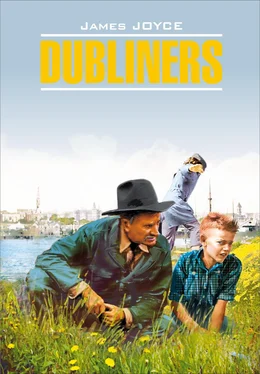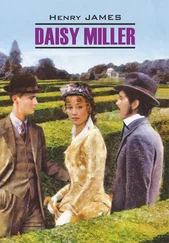Джеймс Джойс - Dubliners / Дублинцы. Книга для чтения на английском языке
Здесь есть возможность читать онлайн «Джеймс Джойс - Dubliners / Дублинцы. Книга для чтения на английском языке» — ознакомительный отрывок электронной книги совершенно бесплатно, а после прочтения отрывка купить полную версию. В некоторых случаях можно слушать аудио, скачать через торрент в формате fb2 и присутствует краткое содержание. ISBN: , Жанр: foreign_language, literature_20, foreign_prose, на английском языке. Описание произведения, (предисловие) а так же отзывы посетителей доступны на портале библиотеки ЛибКат.
- Название:Dubliners / Дублинцы. Книга для чтения на английском языке
- Автор:
- Жанр:
- Год:неизвестен
- ISBN:978-5-9925-0839-0
- Рейтинг книги:5 / 5. Голосов: 1
-
Избранное:Добавить в избранное
- Отзывы:
-
Ваша оценка:
- 100
- 1
- 2
- 3
- 4
- 5
Dubliners / Дублинцы. Книга для чтения на английском языке: краткое содержание, описание и аннотация
Предлагаем к чтению аннотацию, описание, краткое содержание или предисловие (зависит от того, что написал сам автор книги «Dubliners / Дублинцы. Книга для чтения на английском языке»). Если вы не нашли необходимую информацию о книге — напишите в комментариях, мы постараемся отыскать её.
Книга адресована студентам языковых вузов и всем любителям современной англоязычной литературы.
Dubliners / Дублинцы. Книга для чтения на английском языке — читать онлайн ознакомительный отрывок
Ниже представлен текст книги, разбитый по страницам. Система сохранения места последней прочитанной страницы, позволяет с удобством читать онлайн бесплатно книгу «Dubliners / Дублинцы. Книга для чтения на английском языке», без необходимости каждый раз заново искать на чём Вы остановились. Поставьте закладку, и сможете в любой момент перейти на страницу, на которой закончили чтение.
Интервал:
Закладка:
“This page or this page? This page. Now, Dillon, up! ‘Hardly had the day’… Go on! What day? ‘Hardly had the day dawned’… Have you studied it? What have you there in your pocket?”
Everyone’s heart palpitated as Leo Dillon handed up the paper and everyone assumed an innocent face. Father Butler turned over the pages, frowning.
“What is this rubbish?” he said. “ The Apache Chief! Is this what you read instead of studying your Roman History? Let me not find any more of this wretched stuff in this college. The man who wrote it, I suppose, was some wretched fellow who writes these things for a drink. I’m surprised at boys like you, educated, reading such stuff. I could understand it if you were… National School boys. Now, Dillon, I advise you strongly, get at your work or…”
This rebuke during the sober hours of school paled much of the glory of the Wild West for me and the confused puffy face of Leo Dillon awakened one of my consciences [19] awakened one of my consciences – ( разг. ) заставило меня почувствовать угрызения совести
. But when the restraining influence of the school was at a distance I began to hunger again for wild sensations, for the escape which those chronicles of disorder alone seemed to offer me. The mimic warfare of the evening became at last as wearisome to me as the routine of school in the morning because I wanted real adventures to happen to myself. But real adventures, I reflected, do not happen to people who remain at home: they must be sought abroad.
The summer holidays were near at hand when I made up my mind to break out of the weariness of school-life for one day at least. With Leo Dillon and a boy named Mahony I planned a day’s miching. Each of us saved up sixpence. We were to meet at ten in the morning on the Canal Bridge. Mahony’s big sister was to write an excuse for him and Leo Dillon was to tell his brother to say he was sick. We arranged to go along the Wharf Road until we came to the ships, then to cross in the ferryboat and walk out to see the Pigeon House. Leo Dillon was afraid we might meet Father Butler or someone out of the college; but Mahony asked, very sensibly, what would Father Butler be doing out at the Pigeon House. We were reassured: and I brought the first stage of the plot to an end by collecting sixpence from the other two, at the same time showing them my own sixpence. When we were making the last arrangements on the eve we were all vaguely excited. We shook hands, laughing, and Mahony said:
“Till tomorrow, mates!”
That night I slept badly. In the morning I was firstcomer to the bridge as I lived nearest. I hid my books in the long grass near the ashpit at the end of the garden where nobody ever came and hurried along the canal bank. It was a mild sunny morning in the first week of June. I sat up on the coping of the bridge admiring my frail canvas shoes which I had diligently pipeclayed [20] had diligently pipeclayed – ( уст. ) прилежно почистил мелом
overnight and watching the docile horses pulling a tramload of business people up the hill. All the branches of the tall trees which lined the mall were gay with little light green leaves and the sunlight slanted through them on to the water. The granite stone of the bridge was beginning to be warm and I began to pat it with my hands in time to an air in my head [21] in time to an air in my head – ( разг. ) в такт мотивчику, звучащему у меня в голове
. I was very happy.
When I had been sitting there for five or ten minutes I saw Mahony’s grey suit approaching. He came up the hill, smiling, and clambered up beside me on the bridge. While we were waiting he brought out the catapult which bulged from his inner pocket and explained some improvements which he had made in it. I asked him why he had brought it and he told me he had brought it to have some gas with the birds [22] to have some gas with the birds – ( сленг ) популять по птичкам
. Mahony used slang freely, and spoke of Father Butler as Old Bunser. We waited on for a quarter of an hour more but still there was no sign of Leo Dillon. Mahony, at last, jumped down and said:
“Come along. I knew Fatty’d funk it.”
“And his sixpence…?” I said.
“That’s forfeit,” said Mahony. “And so much the better for us – a bob and a tanner instead of a bob.”
We walked along the North Strand Road till we came to the Vitriol Works and then turned to the right along the Wharf Road. Mahony began to play the Indian as soon as we were out of public sight. He chased a crowd of ragged girls, brandishing his unloaded catapult and, when two ragged boys began, out of chivalry [23] out of chivalry – ( ирон. ) из рыцарских побуждений
, to fling stones at us, he proposed that we should charge them. I objected that the boys were too small and so we walked on, the ragged troop screaming after us: “Swaddlers! Swaddlers!” thinking that we were Protestants because Mahony, who was dark-complexioned, wore the silver badge of a cricket club in his cap. When we came to the Smoothing Iron we arranged a siege; but it was a failure because you must have at least three. We revenged ourselves on Leo Dillon by saying what a funk he was and guessing how many he would get at three o’clock from Mr. Ryan.
We came then near the river. We spent a long time walking about the noisy streets flanked by high stone walls, watching the working of cranes and engines and often being shouted at for our immobility by the drivers of groaning carts. It was noon when we reached the quays and, as all the labourers seemed to be eating their lunches, we bought two big currant buns and sat down to eat them on some metal piping beside the river. We pleased ourselves with the spectacle of Dublin’s commerce – the barges signalled from far away by their curls of woolly smoke, the brown fishing fleet beyond Ringsend, the big white sailing-vessel which was being discharged on the opposite quay. Mahony said it would be right skit [24] it would be right skit – ( разг. ) было бы здорово
to run away to sea on one of those big ships and even I, looking at the high masts, saw, or imagined, the geography which had been scantily dosed to me at school gradually taking substance under my eyes. School and home seemed to recede from us and their influences upon us seemed to wane.
We crossed the Liffey in the ferryboat, paying our toll to be transported in the company of two labourers and a little Jew with a bag. We were serious to the point of solemnity, but once during the short voyage our eyes met and we laughed. When we landed we watched the discharging of the graceful threemaster which we had observed from the other quay. Some bystander said that she was a Norwegian vessel. I went to the stern and tried to decipher the legend upon it but, failing to do so, I came back and examined the foreign sailors to see had any of them green eyes for I had some confused notion… The sailors’ eyes were blue and grey and even black. The only sailor whose eyes could have been called green was a tall man who amused the crowd on the quay by calling out cheerfully every time the planks fell:
“All right! All right!”
When we were tired of this sight we wandered slowly into Ringsend. The day had grown sultry, and in the windows of the grocers’ shops musty biscuits lay bleaching. We bought some biscuits and chocolate which we ate sedulously as we wandered through the squalid streets where the families of the fishermen live. We could find no dairy and so we went into a huckster’s shop and bought a bottle of raspberry lemonade each. Refreshed by this, Mahony chased a cat down a lane, but the cat escaped into a wide field. We both felt rather tired and when we reached the field we made at once [25] we made at once – ( разг. ) мы сразу направились
for a sloping bank over the ridge of which we could see the Dodder.
Интервал:
Закладка:
Похожие книги на «Dubliners / Дублинцы. Книга для чтения на английском языке»
Представляем Вашему вниманию похожие книги на «Dubliners / Дублинцы. Книга для чтения на английском языке» списком для выбора. Мы отобрали схожую по названию и смыслу литературу в надежде предоставить читателям больше вариантов отыскать новые, интересные, ещё непрочитанные произведения.
Обсуждение, отзывы о книге «Dubliners / Дублинцы. Книга для чтения на английском языке» и просто собственные мнения читателей. Оставьте ваши комментарии, напишите, что Вы думаете о произведении, его смысле или главных героях. Укажите что конкретно понравилось, а что нет, и почему Вы так считаете.












